There is ample evidence of this phenomenon. Beyond the tabloid coverage of real British royalty, we are surrounded by fictional princesses at every turn. Disney has made millions of little girls consider “princess” as a valid career option. ABC’s show, Once Upon a Time, features several members of the official Disney Princess line-up, while NBC has included elements of princess stories in the police-procedural-slash-fairy-tale Grimm. The upcoming Maleficent is set to give us a different take on Sleeping Beauty, while this year’s Mirror Mirror and Snow White and the Huntsman have made Snow White relevant again. Even Stephen Sondheim’s musical, Into the Woods, is getting the Hollywood treatment.
Book
The popularity of the princess is not limited to the silver screen. Indeed, if you walk into almost any bookstore, you will find this week’s featured text. The Paper Bag Princess, written by Robert Munsch and illustrated by Michael Martchenko, has sold over three million copies in multiple languages including Arabic, Chinese, and Flemish. The copy Megan picked up when she couldn’t find the one she was raised with is from the seventieth printing. Munsch did his first readings of the story in 1973 and ‘74, and the book was first published in 1980. A twenty-fifth anniversary edition was released in 2005, and it included a behind-the-scenes look at the classic children’s story.
This is another of our foundational texts. At the same time as we were learning that princesses should sing, talk to animals, and be really, really, ridiculously good-looking, we discovered that this wasn’t the only option. The titular character of The Paper Bag Princess is Elizabeth, a girl introduced as just such a character. When we first meet her, she is beautiful, lives in a castle, wears expensive clothing, and is engaged to marry a prince. By the second page, however, she has lost all of this at the hands of a dragon. And she is Not Amused. Faced with her own lack of clothing, she repurposes a paper bag into a dress and goes to save her prince.
This is the first major subversion of princess-based fairy tales: the prince becomes the damsel in distress. Elizabeth not only decides to save the prince, she chooses to do so immediately after losing everything, including the clothes on her back. She displays immense resourcefulness by first making what must be the only flame-retardant paper bag in existence into a new outfit, then proving that it is the only suit of armour that she will need.
Unlike a fairy tale prince, when she finds the dragon, she doesn’t offer to face him in physical combat. Instead, she frames their conflict as a battle of the wits, knowing that she can use the dragon’s strength against him. This is precisely what she does, appealing to his ego and convincing him through a combination of ludicrous dares and flattery to exhaust himself.
Once the dragon’s out cold, she releases Prince Ronald, and here we get yet another subversion, though admittedly not as delightful as the others. If you read “Just Another Princess Movie,” the article we linked to in the New Age of Princessery post, you are familiar with an argument Lili Loofbourow made: that Merida, having displayed her immense athletic ability and winning her own hand, does not receive cheers, only silence and disapproval. A young woman doing what is not socially acceptable is, in many situations, not going to be praised for her achievement.
Accordingly, Ronald’s first reaction to being saved is not to thank Elizabeth for risking her own life, but to criticize her appearance. Ronald observes, “Elizabeth, you are a mess! You smell like ashes, your hair is all tangled and you are wearing a dirty old paper bag. Come back when you are dressed like a real princess.” In perhaps the most satisfying reply possible, Elizabeth turns his own words back on him: “your clothes are really pretty and your hair is very neat. You look like a real prince, but you are a bum.” Elizabeth has no time for shallow people who evaluate women based on their physical appearance instead of their actual accomplishments. Ronald is unable to look beyond the dirt to see Elizabeth’s BAMF-ness; Elizabeth, however, has learned to see past appearances to Ronald’s rotten core.
For us, the most satisfying sentence may be the last. Having witnessed a distressing number of Disney princess marriages over a period of a little over a month, we find that there are few sweeter phrases than “They didn’t get married after all.”
Verdict: Actual Strong Female Character
TV Show
One of the major issues we will be discussing on this blog is adaptation. We are all used to seeing our favourite comics and books become our slightly less beloved movies and television shows. We know that characters we adore in an original text may not even merit mention in its adaptations. In addition, the nuanced characters of the original may be altered to suit the more streamlined aspect of a single episode or film. This doesn’t always work in female characters’ favour.
Between 1991 and ‘92, a series of television adaptations of Munsch and Martchenko’s stories ran on CTV in Canada, and Showtime and Golden Book Video in the United States. Among the tales adapted: The Paper Bag Princess. Among the tales we wish had not been adapted: The Paper Bag Princess.
The first and most fundamental change occurs in the first sentence. Instead of opening with Elizabeth, the episode begins by establishing the fantasy world and, most importantly, the existence of dragons. Elizabeth is an afterthought, in both the story and her own life. We meet her as she is contemplating a romantic day out with Ronald, and, because this is apparently a Disney movie, she sings about him. Normally, we’d only include snippets of the song in order to make our point, but the lyrics really have to be seen in full:
Since I was a teeny, tiny tike,
I’ve always pictured the man I’d like.
Now that I’m older and almost grown
I’ll tell you ‘bout the kind of guy I want to share my throne:
He’s handsome, he’s young, he’s witty and bright,
His posture is perfect, he’s always polite,
His shoes are shiny, he wears splendid clothes,
He never gets a pimple on his royal nose
He’s a perfect, perfect guy,
Athletic, strong and cute.
He is extremely wealthy
And he’s a prince to boot.
A perfect guy, a perfect guy!
Elizabeth is portrayed as obsessed with marriage and her future husband; instead of one page of lovesickness, she gets several ridiculous minutes of bizarre “Hopelessly Devoted to You”-inspired insanity. Throughout this time she looks foolish, because Ronald is obviously a git. He is so awful, in fact, that he leaves Elizabeth to die in the dragon attack, literally barring his doors.
Still, she decides to save him. This is where things get a bit weird. Elizabeth does not merely follow the trail of burnt forests and horses’ bones, but a path comprised of fairy tale scenarios. She saves Hansel and Gretel from the witch, escapes from the three bears who have mistaken her for Goldilocks, and alerts a golf club-wielding Grandmother to the fact that the wolf is lying in her bed. It’s a bizarre interlude that may or may not be filler, albeit filler that portrays Elizabeth as a proactive problem-solver.
The showdown with the dragon and the exchange between Ronald and Elizabeth follow the book fairly closely, until the dragon wakes up. Why does he wake up, when the whole point of the showdown was that he would be taken out of commission? Because the adaptation can’t quite deal with the idea of Elizabeth being awesome on her own. The writers were clearly more interested in the dragon anyway, giving him more songs and at least equal screentime. When Elizabeth stands up to Ronald, the narration states that “the dragon looked at Elizabeth. She was acting like a dragon herself.” Considering the fact that all we’ve seen the dragon do by this point is destroy property, discuss his many mass murders, and rap truly atrocious songs, this is hardly the praise the show wants us to think it is.
Instead of Ronald leaving on his own, the dragon tells him, “You heard what the lady said,” and promptly lights the seat of his pants on fire. When Elizabeth sings a reprise of her song, she concludes that she doesn’t need a guy, or at least not a jerk like Ronald. However, she makes this assertion while an image of her dancing with the dragon plays across the screen. In the final shot, Elizabeth flies off with the dragon into the same sunset that her book counterpart skipped into alone. While she explicitly rejects her earlier dependence on male humans, she nevertheless relies on a male dragon. She also promptly instructs the dragon in the art of social conventions and niceties, because apparently the same girl who walked off into the sunset wearing only a paper bag, gleefully defying social expectations, is actually really into teaching others the rules of etiquette.
Verdict: Strong Female Character ™
Song
Again, the lyrics must be seen (or heard) to be believed:
Hey Elizabeth, don't raise the drawbridge darling.
I've been waiting a long time for someone like you.
For someone like you.
You hide behind your insecurities.
The paper bag around your waist
And the mud upon your face puts them above you.
But I still love you.
‘Cause I'm standing in my tin foil armour,
My dollar store broadsword is by your side.
But you give away your heart ‘cause you think you’re ugly,
So let me hold your arm.
Hey Elizabeth I'm just a peasant school boy.
But I've been waiting a long time to hold your hand,
Or something like that.
I'm not a soldier and I'm not a king,
But I can play a mean guitar
And you can talk to me about almost anything,
Without worrying.
‘Cause I'm standing in my tin foil armour,
My dollar store broadsword is by your side.
But you give away your heart ‘cause you think you’re ugly,
So let me hold your arm.
Hey Elizabeth don't think that I am ok
‘Cause I've got problems just like you, but I am fine.
‘Cause you are mine.
If we put our faith into God above,
Then He will protect us both, and He'll keep us strong
As long as we’ve got love.
And we've got love.
It’s tempting just to leave this here; no comment is really necessary. At the same time, we’d like to take our own dollar store broadswords and eviscerate this song. It is a perfect demonstration of the way in which people can misinterpret and manipulate woman-positive texts to suit patriarchal norms. This Elizabeth shares nothing with the paper bag princess except her name and her outfit.
The major problem lies in the narrator of the song: a boy in love with Elizabeth who nevertheless sees the real girl about as clearly as Ronald does. He frames her positive qualities in terms of what he finds attractive, stating that he has “been waiting a long time for someone like [her]”. He goes even further, suggesting that despite the problems that he thinks she faces -- a list which notably does not include being woefully misread by some idiot with tin foil on his shoulders -- he loves her and that should be enough. Even worse, she is apparently healed by his love and his ownership (because we should remember that she is his, just in case we forget that even though he’s portraying himself as her prize, she is still an object). The message of independence is completely lost in translation.
What is even more impressive is the way in which the narrator fails to understand the true meaning of the paper bag. He suggests that the bag and the dirt that covers her body are marks of her insecurity, which is patently ridiculous; the paper bag is, initially, just a concession to the need to be clothed, and at the end, it is actually the proof of her unquestioning acceptance of herself, regardless of what others think. In addition, insecure people are not going to try to rock a paper bag dress. (Yes, we understand that they’re using the paper bag metaphorically, but Munsch’s metaphor was better.)
In summary, this song may actually outdo Taylor Swift’s “Love Story” in terms of missing the point of the reference text.
Verdict: Love Interest
Conclusion
Robert Munsch is known for his oral storytelling methods and performances, so it is no surprise that one of his stories has been re-told in several versions. One of the great assets of oral storytelling lies in the fact that no telling is ever exactly like another. Even Munsch’s own recorded readings of The Paper Bag Princess differ somewhat from the text.
Indeed, the text and its illustrations have undergone a few changes themselves. In the original draft, Munsch had Elizabeth punching the rather deserving Ronald, and Martchenko’s final drawing once depicted an Elizabeth who had cast off her paper bag, skipping into the sunset naked and completely free of all social convention.
However, those changes are changes of degree, not of kind. A television episode that leaves the ultra-independent, capable Elizabeth of the book with a dragon companion/enforcer and the hope of meeting a better guy is not really telling the same story. A song that appropriates a symbol of feminine freedom only to enforce systematically all of the things the original defies is more of an affront than an adaptation. An Elizabeth derived from either of these two versions would do better to wear the paper bag on her head than on her body.
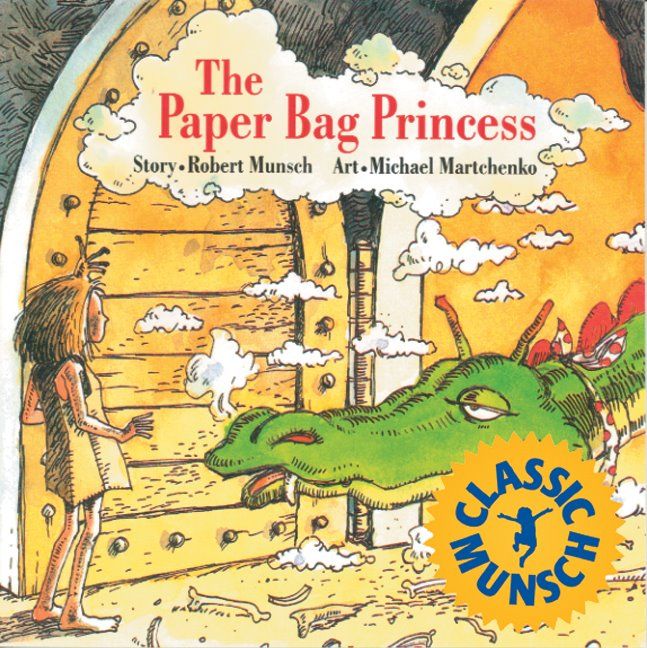
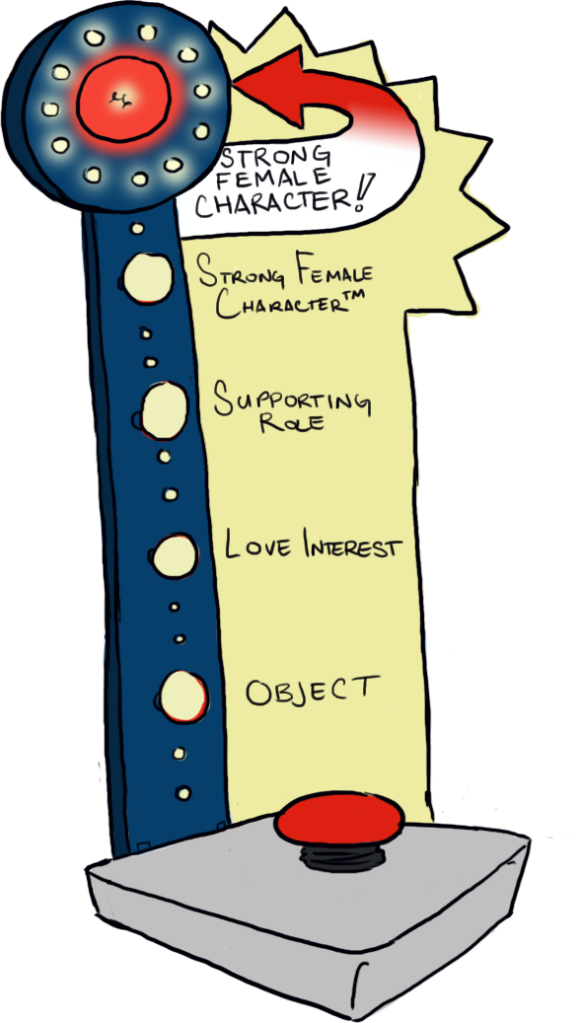
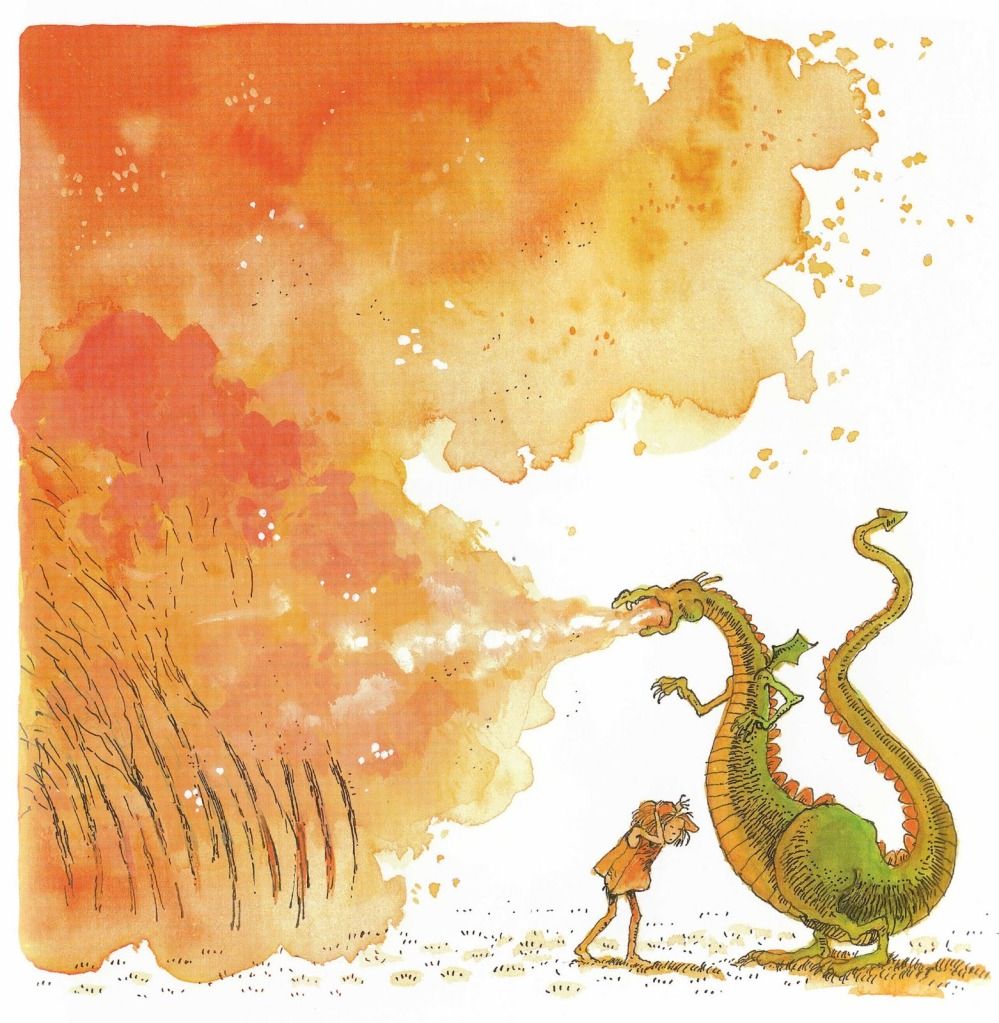

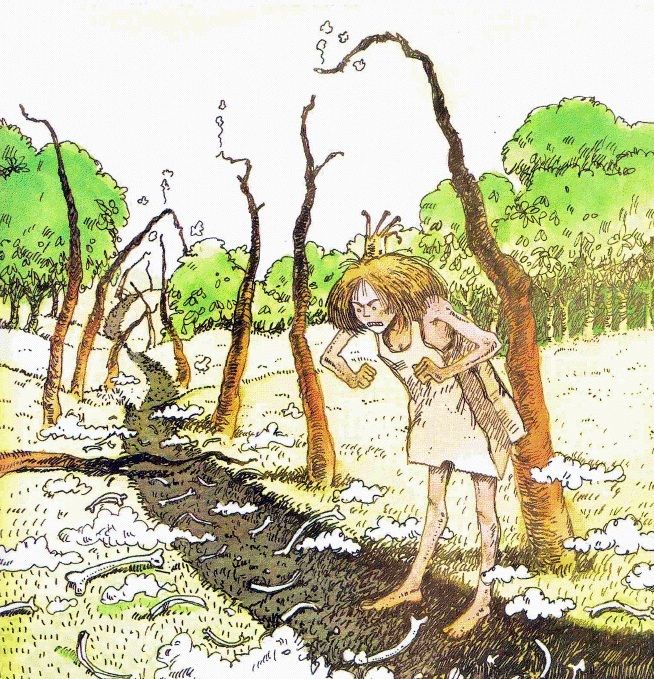
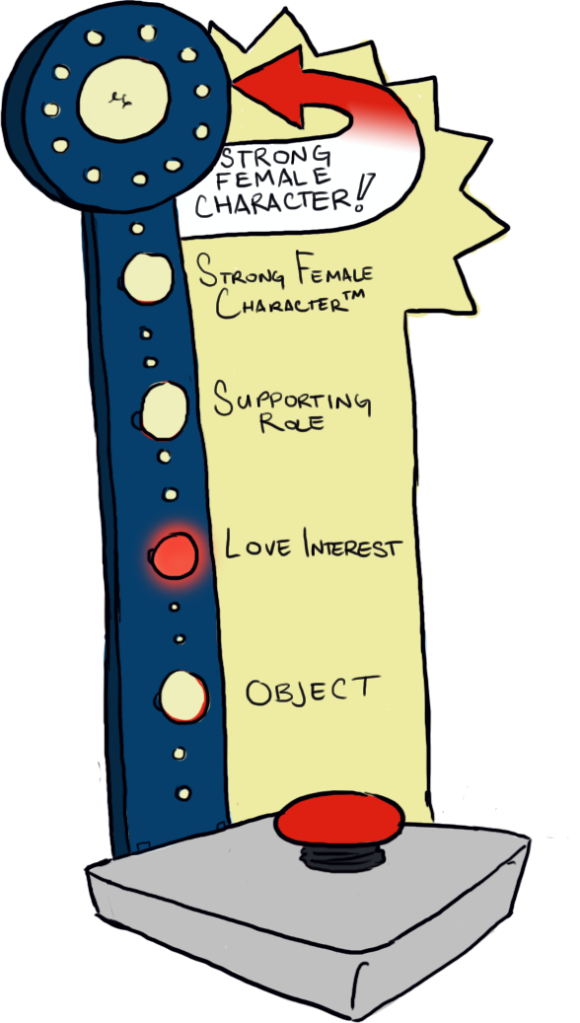

Commenting because Ashley told me to, lulz. I'd be really interested to see you guys write about the character Hushpuppy in the movie Beasts of the Southern Wild. =)
ReplyDeleteALSO THIS BLOG IS AWESOME AND YOU ARE AWESOME AND YOU SHOULD FEEL AWESOME.
Consider Hushpuppy added to the schedule.
DeleteI can't speak for Ashley, but I personally agree with your assessment. Now that we're getting some feedback, I think the awesomeness will only increase. On that note, thanks for being the first person to comment! YOU TOO ARE AWESOME!